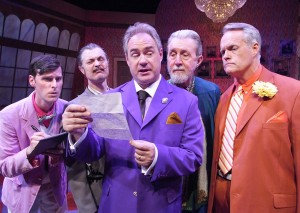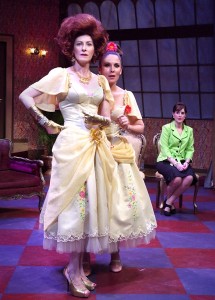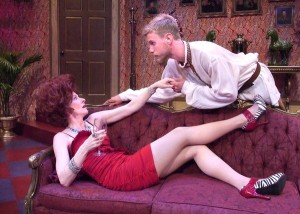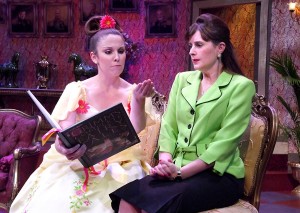A GOGOL BORDELLO
In adapting Nikolai Gogol’s 1836 comedy The Government Inspector (also known, in direct translation, as The Inspector General) for a modern idiom, Oded Gross has taken a work of enduring satire and made of it an instantly dated parody of 2011. The original stands outside nation, era, or political alignment as an indictment of the whorishness in human nature. Mr Gross’s adaptation, even if he corrected its very fixable dramatic problems, would remain a piece of specifically American liberal propaganda. It’s too bad, because if it had premiered in January or even March of this year, it would have felt timely. Still, it is an enormously inventive work-in-progress, extremely funny, and blessed with an imaginative and brilliantly-cast co-production by Furious Theatre Company and Theatre @ Boston Court, directed by Stefan Novinski.
 When a vicious and extortionate small-town government mistakes a conniving reprobate (Adam Haas Hunter as Khlestakov) for an important official, mayor Anton (John Billingsley), his wife Anna (Shannon Holt) and daughter Marya (Megan Goodchild), and his cronies (Alan Brooks, Joe Fria, Sara Hennessey, Dana Kelley Jr) spin in agonized circles of venality to cover their rears and further their ends. Khlestakov’s servant Osif (Eileen T’Kaye) and a foreign doctor (Jacob Sidney) complicate and complement the madness. Mr Gross has done a wonderful job of compressing five acts into a couple of hours, amalgamating and lovingly delineating characters, giving them witty dialogue, and interspersing mostly fun – though not particularly necessary – original songs. He also invents many subplots that please even when they don’t always make sense or go anywhere.
When a vicious and extortionate small-town government mistakes a conniving reprobate (Adam Haas Hunter as Khlestakov) for an important official, mayor Anton (John Billingsley), his wife Anna (Shannon Holt) and daughter Marya (Megan Goodchild), and his cronies (Alan Brooks, Joe Fria, Sara Hennessey, Dana Kelley Jr) spin in agonized circles of venality to cover their rears and further their ends. Khlestakov’s servant Osif (Eileen T’Kaye) and a foreign doctor (Jacob Sidney) complicate and complement the madness. Mr Gross has done a wonderful job of compressing five acts into a couple of hours, amalgamating and lovingly delineating characters, giving them witty dialogue, and interspersing mostly fun – though not particularly necessary – original songs. He also invents many subplots that please even when they don’t always make sense or go anywhere.
One example: Mr Gross develops a moving story for Marya, in which the ingenue has immersed herself in fairy tales to avoid the brutality of her real environment. Early on, she engages in a beautiful duet with another character who might turn out to be her prince charming; the scene is a comic highlight of an already hilarious show. But this character does not turn into a love interest; these two never speak again, and the whole glorious scene is dropped and forgotten.
A related note: much later when Marya’s fantasy bubble finally bursts against the prick of real life, the ugliness of the moment stops the show dead. It’s the only moment in the whole play when the tone shifts anywhere close to this level of seriousness, and while Mr Gross’s event works thematically, Mr Novinski could have directed it with a little more subtlety. Or a lot more subtlety. Or any subtlety at all. From that hideous moment onward the play rushes toward a poignant and dismal end – again, the invention of its adaptor – but never again alters its absurdly comic pitch to such an extent.
Throughout the play, Mr Gross has interpolated instantly recognizable, not to say blatant, 21st Century political figures and stories. He cleverly plagiarizes the intent if not the event of the Occupy Wall Street movement and its Arab Spring inspiration, but this decision ultimately limits the adaptation’s appeal not least because of his naked contempt for the objects of revolutionary angst.
 Aside from a pedagogical partisanship with one side of a fleeting historical moment, and odd structural issues (like revealing the true Government Inspector to no purpose early on, negating any possible impact for the second reveal, which comes at a much more opportune moment), the play’s biggest problem is its uneven language. Like the last play at Boston Court, Michael Elyanow’s The Children, also recipient of a knockout staging, this one needs at least one more draft for uniform excellence. Some of these characters’ “foibles” (referred to in great detail and with sometimes too much faithfulness) are just too one-note to sustain an entire performance, repeated without development or variation. Some characters, like the one written and directed to imitate a particular Republican clod, say things that are no better-written than what already comes from the real mouth of the real personality; and what benefit is there in hearing that?
Aside from a pedagogical partisanship with one side of a fleeting historical moment, and odd structural issues (like revealing the true Government Inspector to no purpose early on, negating any possible impact for the second reveal, which comes at a much more opportune moment), the play’s biggest problem is its uneven language. Like the last play at Boston Court, Michael Elyanow’s The Children, also recipient of a knockout staging, this one needs at least one more draft for uniform excellence. Some of these characters’ “foibles” (referred to in great detail and with sometimes too much faithfulness) are just too one-note to sustain an entire performance, repeated without development or variation. Some characters, like the one written and directed to imitate a particular Republican clod, say things that are no better-written than what already comes from the real mouth of the real personality; and what benefit is there in hearing that?
 But this adaptation represents a hugely energetic and generally successful effort, and language is among the great strengths of this writer; one hopes that he will persevere in executing a more perfect whole. And really, many of these quibbles may have more to do with this production than with the text Mr Oded turned in. The artistic directors of the Boston Court and Furious Theatres announced pre-show that changes were being made to the script as late as opening night. Such a note surely is unnecessary for the audience to hear; at best it apologizes for the work about to be seen, which is pathetic, and at worst it attempts to excuse it, which is rude. (Overall, theater management around the world, please stop making curtain-delaying announcements from the stage lip; whatever benefit you get from the in-person pitch is surely negated by Mickey and Judy connotations that make your lovely theaters into let’s-put-on-a-show horse barns.)
But this adaptation represents a hugely energetic and generally successful effort, and language is among the great strengths of this writer; one hopes that he will persevere in executing a more perfect whole. And really, many of these quibbles may have more to do with this production than with the text Mr Oded turned in. The artistic directors of the Boston Court and Furious Theatres announced pre-show that changes were being made to the script as late as opening night. Such a note surely is unnecessary for the audience to hear; at best it apologizes for the work about to be seen, which is pathetic, and at worst it attempts to excuse it, which is rude. (Overall, theater management around the world, please stop making curtain-delaying announcements from the stage lip; whatever benefit you get from the in-person pitch is surely negated by Mickey and Judy connotations that make your lovely theaters into let’s-put-on-a-show horse barns.)
 This cast did not seem to have a problem with the changes or anything else. It’s difficult to imagine a circumstance to inhibit a performer like Ms Holt; I misspeak; there is no performer like her. Here, she tics and swills her way through a persona so fraught with inner life that she hardly needs a play to contain her. She and Ms Goodchild make much of a relationship whose dynamics add pathos to a sometimes farcical text. And in a cast of standouts, it is niggardly to mention only a few; but constraints of time limit further praise to the entire ensemble, with two exceptions: to the long-limbed, pop-eyed appeal of Mr Hunter, and to the beautifully burning grimace of Ms T’Kaye, the soul and erstwhile chorus of this tragic comedy. As master and servant, their pairing is classic; as characters of individual trajectory, their work fulfills the purpose of theater as a means of direct communication.
This cast did not seem to have a problem with the changes or anything else. It’s difficult to imagine a circumstance to inhibit a performer like Ms Holt; I misspeak; there is no performer like her. Here, she tics and swills her way through a persona so fraught with inner life that she hardly needs a play to contain her. She and Ms Goodchild make much of a relationship whose dynamics add pathos to a sometimes farcical text. And in a cast of standouts, it is niggardly to mention only a few; but constraints of time limit further praise to the entire ensemble, with two exceptions: to the long-limbed, pop-eyed appeal of Mr Hunter, and to the beautifully burning grimace of Ms T’Kaye, the soul and erstwhile chorus of this tragic comedy. As master and servant, their pairing is classic; as characters of individual trajectory, their work fulfills the purpose of theater as a means of direct communication.
Alas, Donna Marquet’s set and Tina Haatianen-Jones’s costumes highlight the confusion of intention in this production. While some pains have been taken in the text to blur the source material’s Russian origins, some references have been left in; and so the set, mostly a very nice picture of Tsarist rusticism, feels at odds with the clearly modern American political references. The inclusion of celebrity portraits in the costume of Russian nobility, including Mark Zuckerberg, David Bowie, and William Shatner, does not help either to orient the viewer or to deconstruct the situation. The costumes, beautifully married to character though they sometimes are, make similarly disjointed and anachronistic statements. When a guy trying to be taken for someone important inexplicably dresses like a Cossack, while the small-town postmaster wears a plaid sweater and pink sportcoat, the term “given circumstances” loses meaning.
 It may be that social media and the 24 hour news cycle have rendered references from less than a year ago into old news. If so, concepts like “timeless” and “perennial” must be foremost in the minds of those attempting a relevant contribution to politically oriented theater. In fact, they always have been; Shakespeare and Oscar Wilde and Dario Fo come to mind, and on the other side, the inseparable-from-socialism GB Shaw (try and remember the last time you saw a full production of Major Barbara or Arms and the Man outside a college campus). Even Nicholas I recognized in Gogol’s original script a deliberate lack of specificity that led him, as it happens erroneously, to conclude that the play was harmless. One measure of the play’s greatness is that in decrying the failings of government, Gogol did not impose his own political views onto his art. He was in fact almost fanatically conservative, very much pro-Tsar and anti-Marxist. Mr Gross’s and Mr Novinski’s work, based on their caricature of recent headlines, cannot be said to enjoy a similar disinterest.
It may be that social media and the 24 hour news cycle have rendered references from less than a year ago into old news. If so, concepts like “timeless” and “perennial” must be foremost in the minds of those attempting a relevant contribution to politically oriented theater. In fact, they always have been; Shakespeare and Oscar Wilde and Dario Fo come to mind, and on the other side, the inseparable-from-socialism GB Shaw (try and remember the last time you saw a full production of Major Barbara or Arms and the Man outside a college campus). Even Nicholas I recognized in Gogol’s original script a deliberate lack of specificity that led him, as it happens erroneously, to conclude that the play was harmless. One measure of the play’s greatness is that in decrying the failings of government, Gogol did not impose his own political views onto his art. He was in fact almost fanatically conservative, very much pro-Tsar and anti-Marxist. Mr Gross’s and Mr Novinski’s work, based on their caricature of recent headlines, cannot be said to enjoy a similar disinterest.
The outstanding work done here should not go in vain. Furious and Boston Court are on a very short list of exciting companies doing consistently daring and excellent work. Everyone connected with this production should be proud, and the show should be seen. But if the adaptation is to live past its moment, it will have to undergo its own revolution and separation of powers.
photos by Ed Krieger
The Government Inspector
Furious Theatre Company and Theatre @ Boston Court in Pasadena (L.A. Theater)
scheduled to end on August 26, 2012
for tickets, call 626.683.6883 or visit http://web.ovationtix.com/trs/cal/112

